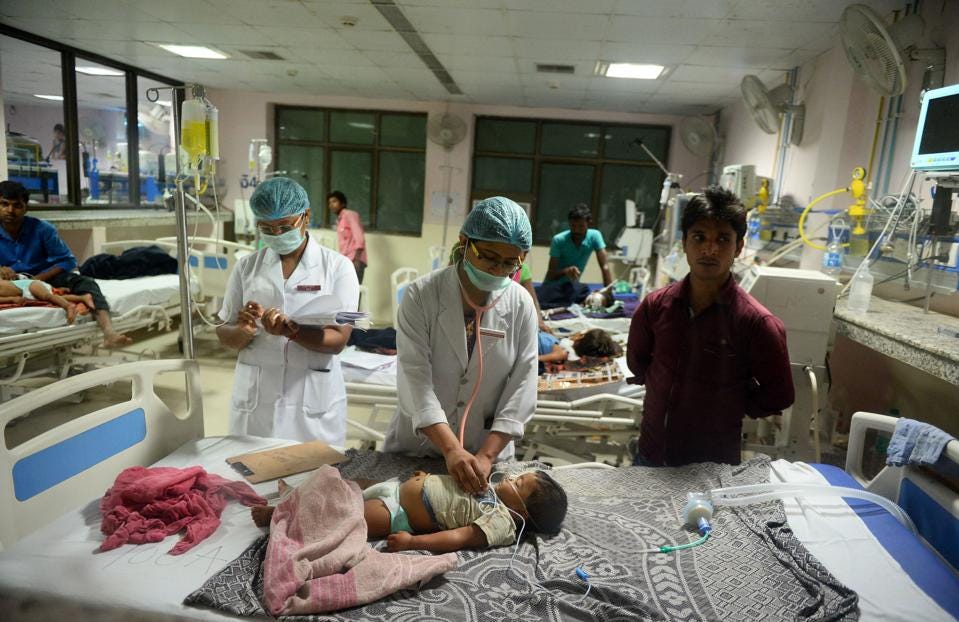Dr Yogesh Manhas
Indian healthcare can be described as disorganized matrix with no uniformity in quality of care. While some hospitals are well equipped others are not. The biggest issue is lack of adequate number of qualified doctor and nurses.
Every year large number of doctors and nurses migrate to other countries. The reason for migration are many: Better salaries, recognition of the worth, quality work environment, better work-life balance, dignity of work , no bureaucratic high handedness and no exploitative character of corporate hospitals of India.
The faculty recruitment criteria in medical colleges and AIIMS too is such that it filters out large number of qualified experienced doctors and does not accommodate those who worked in private hospitals or overseas after their post graduation.
The mandatory requirement for research publications for the post of faculty is also an impediment to hire experienced doctors. Though research is an important part of medical field but making it mandatory for faculty only dilutes the quality of research. The very fact that despite having large number of medical institutes , there are very few quality research or landmark studies from India strengthen the argument. There is need to differentiate between consultants and professors. Whereas consultant spend more time for clinical duties and training junior doctors/students , professors are given more time and funds for clinical research but both are part of faculty. Those consultants who engage themselves in high quality research be designated as professors and compensated for over and above their salary.
Currently there are no consultant posts at medical colleges. Question to be asked is why Indian healthcare system cannot retain its workforce by addressing above mentioned reasons for brain drain.
Majority of the Indian healthcare system is private. Though private healthcare may provide more choice to the patients and reduce waiting time but it does have potential to corrupt medical profession and it did have its adverse impact on Indian healthcare. Corruption is not necessarily in terms of inflating cost of patient care but in applying scientific evidence , provision of qualified adequate manpower, transparency and ethics . The adverse impact of privatization is more prominent in tertiary care.
One area of healthcare that should not have been privatized in India is tertiary health care. Diseases that require ICU care , complicated surgeries, Emergency care, trauma care require extensive resources for quality care. Private hospitals would not invest in extensive infrastructure and manpower required to provide quality care for such cases though they would continue to accept patients providing substandard care. Even the best of private hospitals lack required infrastructure and particularly manpower to provide high quality tertiary care.
Private hospitals policies are framed keeping in mind revenue generation and profit which is not bad as long as it does not cause huge financial burden on patient and his family. Problem is that the financial burden is inevitable in case of privatized tertiary care. Only few rich can afford it.
Ayushman policy has further complicated equation with regard to private healthcare. The rates of Ayushman packages are not viable. It is almost impossible to provide quality services at Ayushman rates but to accommodate patients, private hospitals resort to cost cutting seriously affecting care of the patients.
India can have best of both private and public healthcare system provided Government takes the responsibility of tertiary care and deliver it with efficiency and high quality. Each district should have a tertiary care hospital with sufficient beds to accommodate patients referred from primary and secondary hospitals of the area. This requires a robust means of communication between tertiary and other hospitals in the district.
Patient- doctor relation in India too is one of mistrust and sense of suspicion. In fact fear of violent retribution from patient’s family prevent doctors engaging in a transparent and honest discussion about complications. No healthcare system in the world is immune to medical complications .
Medical complications are not due to individual fault of doctors/ nurses but mainly due to system failure, a system which has three important components namely:
Infrastructure , Manpower and Process of care. If any one of the component is weak, it will adversely affect the outcome of the patient. Infrastructure and manpower are the responsibility of the government/ corporate whereas process of care is responsibility of the heads of respective departments.
Hospitals need to invest in strengthening these three components in order to reduce chances of human errors and efficiently manage complications
Public fail to realize that Infrastructure and manpower are extremely crucial for the patient outcome but instead only blame doctors that too violently when failed to get desired outcome.
Every state must make violence against doctors as non- bail able cognizable offence.
However there is also a need to establish a mechanism to address the grievances of patients and family members in a rational manner so as to generate trust among them.
It is high time that Government of India increase its health budget which is currently less than 3 percent of GDP, to improve quality of care at public hospitals, establish tertiary care hospitals in each district and change policies to retain qualified workforce in the country.
(The author is MD Anaesthesiology EDIC Senior Consultant Intensive Care)
Trending Now
E-Paper


